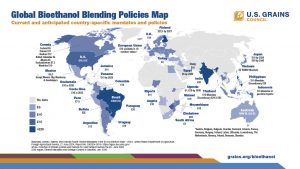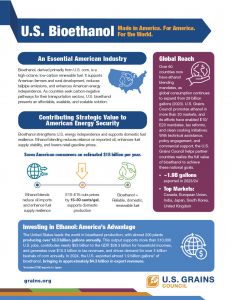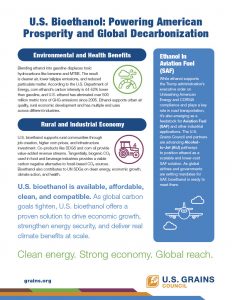Global Demand For Ethanol Remains Strong
At the U.S. Grains Council, we believe biofuels such as bioethanol are vital to international transportation decarbonization efforts; and are dedicated to helping countries meet their global climate commitments as they fuel forward to a net-zero world. U.S. bioethanol provides an immediate solution to decarbonize road transportation with long-term potential to decarbonize long-haul trucking, aviation, and maritime transport. Bioethanol is:
- Better for your health and global consumers.
- Better for the environment because it displaces harmful hydrocarbons in gasoline, helping reduce emissions, particulate matter, carbon monoxide, nitrous oxides and tailpipe exhaust.
- A biodegradable and renewable, high-octane fuel derived from the sugars, starches and cellulose in plants, which reduces reliance on fossil fuels – a finite resource.
- A cleaner burning, higher octane and lower priced option that’s better for our air, engines and wallets.
Global demand for bioethanol remains strong. The U.S. Grains Council works with partners around the world to develop and expand the bioethanol market.
Consumption of ethanol has grown from 16 billion gallons (61 billion liters) in 2010 to more than 29 billion gallons (109 billion liters) in 2023 (IEA, 2023). Concerns about the environment, carbon reduction, and air quality have led governments to use bioethanol as a readily available resource to provide immediate carbon reduction benefits. More than 60 countries have bioethanol blending policies – a number that is growing as countries seek to capture the economic, environmental and air quality health benefits of bioethanol.

The U.S. Grains Council engages governments and industries across the globe to develop the bioethanol market and promote sales of U.S. bioethanol worldwide. Economic, environmental and health priorities are propelling governments to assess the role of bioethanol in their economies because it offers a dynamic role as an input into the beverage, chemical, cosmetic, pharmaceutical, and transport industries due to its CO2, solvent, antibacterial and oxygenate properties. Bioethanol’s production creates high-protein livestock feed as well as environmental products including bio-degradable plastics that replace forever products. It’s versatility and productive properties create positive economic, environmental and health outcomes that improve lives.
In addition to its traditional on-road uses, the Council advances emerging-market opportunities for bioethanol applications and is diligently pursuing all possible industry sectors.


